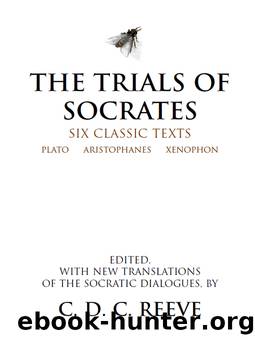The Trials of Socrates by Plato

Author:Plato
Language: eng
Format: epub
Tags: ebook, book
Publisher: Hackett Publishing Company, Inc.
Published: 2011-11-27T16:00:00+00:00
1. See Apology 33e1 note.
2. Legend had it that Athens was once obliged to send King Minos of Crete an annual tribute of seven young men and seven maidens to be given to the Minotaur—a monster, half man and half bull, that he kept in a labyrinth. With the help of a thread given to him by Minos’ daughter Ariadne, Theseus, a legendary king of Athens, made his way through the labyrinth, killed the Minotaur, and escaped, thus ending the tribute. Each year, Athens commemorated these events by sending a mission of thanks to the sanctuary of Apollo on the sacred island of Delos. No executions could take place in Athens until it returned from its voyage. See Phaedo 58a3–c5.
3. A headland on the southeast coast of Attica, about 30 miles from Athens.
4. Namely, the Eleven. See Apology 37c2 note.
5. The quotation is from Homer, Iliad IX.363. Agamemnon (Apology 41c1), leader of the Greek forces, has insulted Achilles (Apology 28c4 note) by taking back his war prize, Briseis. Achilles withdraws from the battle, so that the Greeks suffer terrible losses. Agamemnon, realizing his mistake, offers enormous recompense but without coming to apologize in person. In response, Achilles threatens to set sail the next morning, so that with good weather he will arrive at his home “in fertile Phthia” on the third day. The dream means that Socrates’ soul will find its home on the third day (counting, as usual among the Greeks, both the first and last member of the series).
6. Socrates often argues that wisdom is the only really good thing and ignorance (lack of wisdom) the only really bad one. See Charmides 174b11–c3; Euthydemus 281d2–e5; Meno 87d2–89a5. Because the majority are unwise, they cannot reliably produce the effects they want.
7. Sukophantai : individuals who prosecuted others in order to get the reward offered in Athenian law to successful prosecutors as public benefactors, or as a way of blackmailing someone who would pay to avoid prosecution, or for personal or political gain of some other sort.
8. Simmias and Cebes (also from Thebes) were followers of Socrates and serve as his chief interlocutors in Phaedo .
9. See Apology 37c4–e2.
10. Thessaly is a region in the north of Greece.
11. See Apology 34d6–8.
12. See Homer, Iliad XXII.490–498: “An orphan has no friends. / He hangs his head, his cheeks are wet with tears. / He has to beg from his dead father’s friends, / Tugging on one man’s cloak, another’s tunic, / And if they pity him he gets to sip / From someone’s cup, just enough to moisten / His lips but not enough to quench his thirst. / Or a child with both parents still alive / Will push him away from a feast, taunting him, / ‘Go away, your father doesn’t eat with us.’” (Trans. Stanley Lombardo.)
13. See Apology 32c8–33a5.
14. See Apology 29c2 and note.
15. See Euthyphro 14e9.
16. See Apology 38a5–6.
17. Or stays put. See Euthyphro 11b6–e1.
18. So that living justly guarantees (or is the same thing as) living a happy life.
Download
This site does not store any files on its server. We only index and link to content provided by other sites. Please contact the content providers to delete copyright contents if any and email us, we'll remove relevant links or contents immediately.
The remains of the day by Kazuo Ishiguro(8998)
Tools of Titans by Timothy Ferriss(8393)
Giovanni's Room by James Baldwin(7346)
The Black Swan by Nassim Nicholas Taleb(7129)
Inner Engineering: A Yogi's Guide to Joy by Sadhguru(6793)
The Way of Zen by Alan W. Watts(6614)
The Power of Now: A Guide to Spiritual Enlightenment by Eckhart Tolle(5781)
Asking the Right Questions: A Guide to Critical Thinking by M. Neil Browne & Stuart M. Keeley(5775)
The Six Wives Of Henry VIII (WOMEN IN HISTORY) by Fraser Antonia(5514)
Astrophysics for People in a Hurry by Neil DeGrasse Tyson(5189)
Housekeeping by Marilynne Robinson(4446)
12 Rules for Life by Jordan B. Peterson(4303)
Ikigai by Héctor García & Francesc Miralles(4274)
Double Down (Diary of a Wimpy Kid Book 11) by Jeff Kinney(4268)
The Ethical Slut by Janet W. Hardy(4251)
Skin in the Game by Nassim Nicholas Taleb(4248)
The Art of Happiness by The Dalai Lama(4130)
Skin in the Game: Hidden Asymmetries in Daily Life by Nassim Nicholas Taleb(4004)
Walking by Henry David Thoreau(3961)
